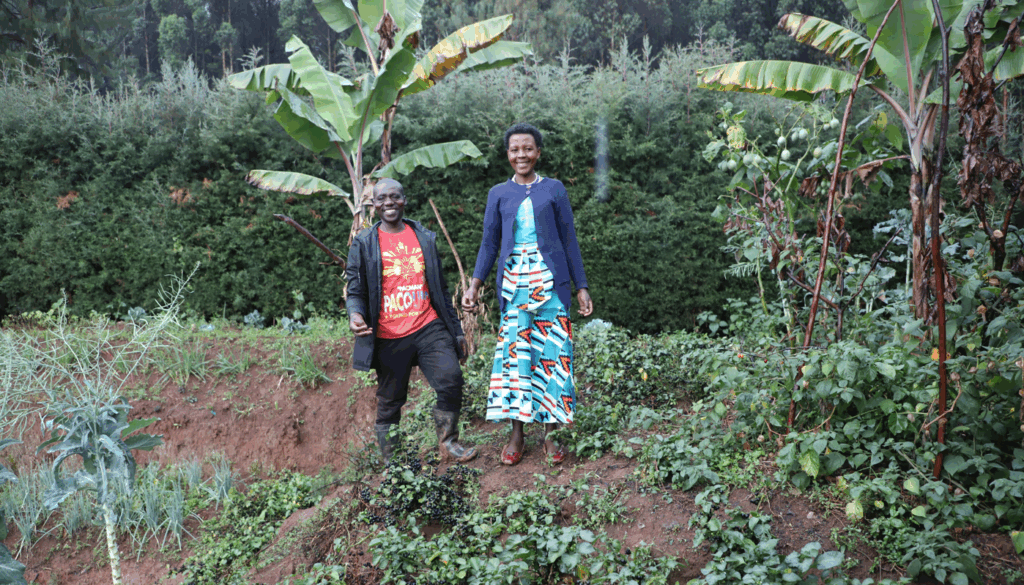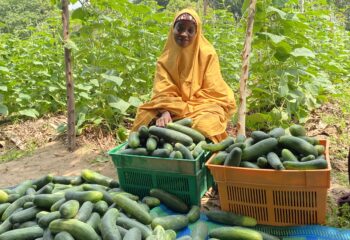
Sarah Tushabomwe and her husband Denis Mwegisire have long had a dream to improve their household farm in the hilly Nyabyumba village of Uganda. They have sought healthy soils to increase farm productivity and to expand market access for their produce.
Just two years ago, however, their dream seemed out of reach. The couple struggled with declining soil fertility caused by erosion, which led to low yields and meager household income. Meeting daily needs and paying school fees for their children was a constant challenge.
“Instead of increasing, our production was decreasing,” Sarah recounted. “We would put in a lot of energy to get a good harvest, but ultimately, we got less.”
Despite their hard work and dedication, Sarah and Denis lacked vital information on the importance of erosion control and soil nutrient replenishment. Neither did they apply manure, nor could they afford to buy fertilizers. Furthermore, they used uncertified potato seeds, which made these crops vulnerable to wilt and other diseases; and without proper pest and disease control, their yields declined even more.
When the Building Resilience and Inclusive Growth of Highland farming systems for rural Transformation (BRIGHT) program, implemented by IFDC with funding from the Ministry of Foreign Affairs of the Netherlands, initiated activities in their village, Sarah and Denis were introduced to new farming practices that helped fill these gaps.
Since joining the program, Sarah and Denis have seen significant improvements in their farm.
Through BRIGHT’s Participatory Integrated Planning (PIP) approach, Sarah and Denis created a household vision board to create a plan and ensure shared involvement. During community mobilization, Sarah was elected as a farmer innovator, a role that has empowered her to advocate for change among her peers.
Most importantly, both Sarah and Denis received training on soil and water conservation techniques, the use of quality farm inputs, integrated pest and disease management, income diversification, and nutrition.
“We were taught about soil and water conservation, and now we have constructed terraces and planted grasses as stabilizers to control erosion,” Denis explained. “We also learned how to make and use compost manure, the benefits of certified seeds, and the importance of diversifying our income through mixed farming.”

Since joining the program, Sarah and Denis have seen significant improvements in their farm. Their diets have also become more diverse, as they now harvest fruits and vegetables, such as gooseberry, tree tomato, cabbage, kale, spinach, amaranth, eggplant, pumpkin, and green bell pepper, from their kitchen garden. Their income has also risen, particularly from selling eggplants and pumpkins. To further bolster their earnings, they have expanded their banana production.
Thanks to the soil and water conservation structures they installed, including fanya chini terraces (trenches that slow runoff) and elephant grass barriers, soil erosion has been significantly reduced. The elephant grass also provides fodder for their livestock, which they bought to boost manure production for their farm.
Sarah noted that using manure has greatly improved their crop yields: the banana bunches they now harvest are noticeably larger compared to former harvests. Planting potatoes in rows and using certified seeds, which are now more accessible, have resulted in a 50% increase in harvest while reducing the quantity of seed required – and consequently the cost of production as well. The use of certified seeds, along with a newly implemented spray program, has also helped reduce disease and pest prevalence.
Sarah and Denis have also benefited from training on post-harvest handling, including the use of proper storage bags and pallets, to protect their produce from pests, improving both the quality and shelf life of their harvests. They have also begun to keep farm records to track their business.
Additionally, IFDC and Agriterra, a partner of the project, have linked Sarah and Denis to the Nyabyumba Farmers Cooperative, which offers access to seeds, fertilizers, and chemicals on credit, repaid after harvest. They also aggregate and sell their produce collectively through the cooperative, securing better prices in the market.
Sarah and Denis are proud of the transformation they have achieved with the support of BRIGHT. They can now comfortably pay their children’s school fees, and working together as a team has strengthened their farming enterprise.
Now, as they review their household vision board after so much progress, Sarah and Denis are confident that it is only a matter of time before all their plans become reality.
The Building Resilience and Inclusive Growth of Highland farming systems for rural Transformation (BRIGHT) project is funded by the Embassy of the Kingdom of Netherlands in Uganda and implemented in partnership with Agriterra, the Uganda Ministry of Agriculture, Animal Industry and Fisheries (MAAIF), the National Agricultural Research Organization (NARO), district local governments, and private sector partners.





